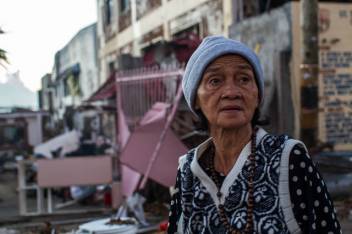 The Philippines has been hit by a disaster of an unprecedented force. We have all seen the photos and videos of Tacloban and other places situated in the path of Typhoon Haiyan. Houses were blown apart as if made of cardboard and cargo ships have been tossed ashore by huge waves.
The Philippines has been hit by a disaster of an unprecedented force. We have all seen the photos and videos of Tacloban and other places situated in the path of Typhoon Haiyan. Houses were blown apart as if made of cardboard and cargo ships have been tossed ashore by huge waves.
HelpAge and our partner Coalition of Services of the Elderly (COSE) have joined the international relief effort to ensure that the needs of older people are taken care of.
Tying tin roofs to trees helped in some areas
In the midst of this huge relief operation, I’ve been asked whether our disaster risk reduction work in the Philippines has made any difference. We are still awaiting information on this, but we expect that our disaster risk reduction work has made a difference in the areas outside the eye of the typhoon. In these areas tying the tin roofs to trees prevented them from flying around like razor blades and evacuation centres actually proved to be safe havens.
Evacuation plan reduced number of casualties
For the areas in the path of the eye of the typhoon it’s a different story. The force of the typhoon was too destructive and evacuation was the only answer. Fortunately a large part of the population listened to the advice of government authorities and COSE’s text messages to older people’s associations to evacuate or take shelter in designated evacuation centres.
Sadly not all evacuation centres were strong enough to withstand the gusts of 235 mph and tidal surge. However, initial information from the affected areas indicates that evacuation has kept down the number of casualties.
Training older people to prepare for potential disasters
COSE has been working with older people’s associations on disaster risk reduction on the southern island of Mindanao. This island seems to have been spared the worst of Typhoon Haiyan but was severely affected in December 2012 by Typhoon Bopha. I visited Mindanao two weeks ago to get a better understanding of the disaster risk reduction work taking place.
COSE has trained older people’s associations how to prepare themselves for potential disasters. This includes information on the safest places to take shelter during a typhoon or earthquake, the importance of having a so called “run-away bag” with essential items such as medicines and birth certificates.
The associations set up sub-committees for search and rescue and also for first aid. Members are trained to support the community during evacuations and to respond. During mock drills, communities and the disaster management unit of the local government will simulate a disaster situation and practice what they have learned. These activities increase the community’s confidence and prevents them from panicking before and during disasters. It also encourages cooperation between government authorities and the communities.
Climate change brings stronger storms
Typhoon Haiyan is the 25th storm to enter Filipino territory this year (not all made landfall). It has been the most powerful storm on record. This is alarming and scientists argue that the force of storms is increasing as a result of climate change. This happens because global warming increases the temperature of the sea’s surface, which is where typhoons draw their vast energy from.
Climate change is affecting communities, and older people in particular, in the Philippines but also in other parts of the world. Statistics show that the burden is on developing countries where many people find themselves living in houses that are ill-equipped to resist disasters in risk areas. Governments in developing countries don’t have access to the large sums of money needed to implement disaster risk reduction measures, such as sea defence structures.
Typhoon Haiyan is yet another wake-up call to the impact of climate change which incidentally coincides with the International Climate Change Conference taking is currently taking place in Warsaw. World leaders participating in this conference will try to reach an agreement on measures to counter climate change.
The delegation leader of the Philippines, Yeb Saño, became very emotional during the opening of the conference and called for urged international action. “What my country is going through as a result of extreme climate event is madness. The climate crisis is madness. We can stop this madness. Right here in Warsaw.”
Donate now
In the UK
Our sister organisation, Age International, has launched an emergency appeal to support older people affected by Typhoon Haiyan.
Or you can text URGENT to 70004 to donate £5 to help older people in the Philippines.
In the USA
Our sister organisation, HelpAge USA, has launched an emergency appeal to support older people affected by Typhoon Haiyan.
Elsewhere
If you live outside the UK and the USA you can donate to support older people by Typhoon Haiyan here.
